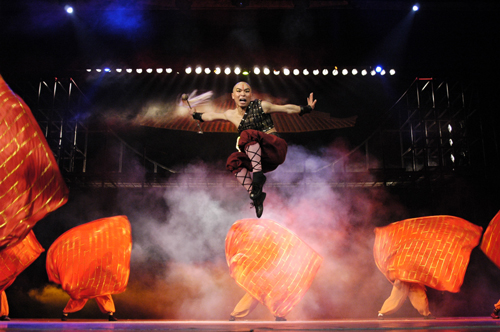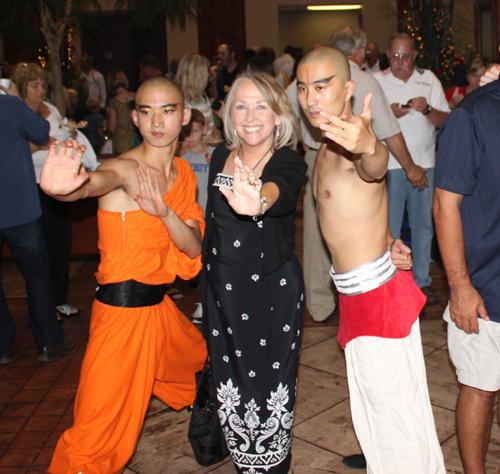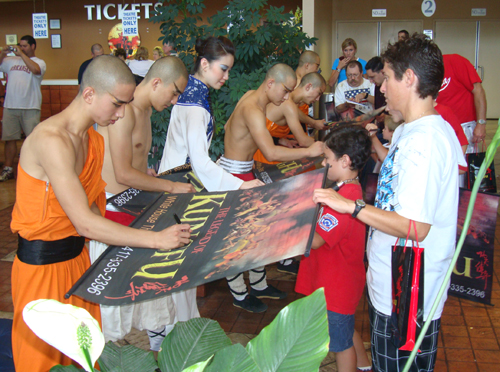Chinese kung fu, culture on the way
 |
|
The Chinese stage show "The Legend of Kung Fu" comes to Branson, Missouri, in the US. The show combines traditional martial arts skills, aerial ballet, dance, music and narratives with feats such as breaking iron bars on people’s heads and balancing on the tip of a spear. It has been performed more than 3,000 times worldwide and has been watched by more than 2 million people. |
This past July, an unexpected phone call stirred Cao Xiaoning while he was at one of his usual Chinese cultural ministry meetings on domestic cultural restructuring, aiming to accelerate Chinese cultural undertakings at home and abroad in better mechanisms. Cao, the CEO of China Heaven Creation International Performing Arts Co., Ltd., picked up the phone, and was told their theatrical production The Legend of Kung Fu was awarded as 2010 Fan Awards: Best New Show by an online fan group of Branson in Missouri on Twitter this late July.
From this July 1st, The Legend of Kung Fu was performed twice a day at the White House Theater in Branson, Missouri, the third largest performing arts center in America, and home to about 50 theaters, with 11,000 more seats than Broadway. The White House Theater was bought by this show’s producer, China Heaven Creation during the international financial crisis last December, which was the first Chinese purchase of American theaters. Cao was overjoyed.
 |
|
An audience member poses with performers from the Chinese stage show "The Legend of Kung Fu" in Branson, Missouri, in the US. It was voted Best New Show in Branson in July by an online fan group on Twitter. |
The play’s story revolves around the journey of a young apprentice at a kung fu temple to reach enlightenment by overcoming obstacles in his life. It combines traditional martial arts skills, aerial ballet, dance, music and narratives with feats such as breaking iron bars on people’s heads and balancing on the tip of a spear. This show has been performed more than 3000 times worldwide and has been watched by more than 2 million people.
First staged in Chinese Beijing in 2004, The Legend of Kung Fu’s storyline has been modified around thirty times. Many experts, including directors from Broadway, and Jin Xing, a nationally famous director, are hereby invited to help.
Cao replied, “Do in Rome as the Romans do!” This is a must while presenting artworks to western audiences. He recalled one cultural case at Branson, a place located in the Bible Belt, where God is celebrated daily.
In one chapter of this story, narrations for a dance, conveying a Chinese dedication to God of Fire, a nature god according to Chinese customs, were needed. “But there arose a problem then,” Cao said.
The production team considered using “worship to God of Fire” as description of Chinese loyalty to this god, but later found the locals only believed in one God. As a result, “worship” was replaced by an expression like “a ritual for God of Fire,” according to Cao.
Considering that the European audience was impacted much by the tragedies of Shakespeare while they performed in London, one character in this kung fu story, mother of the young apprentice was arranged to die to make the show more touching, Cao added.
In addition, some Chinese stories were incorporated into this kung fu legend. The one of Milarepa, a Tibetan Buddhist Hermit who got enlightened after overcoming various difficulties, was quite typical.
Gao Liting, script writer of The Legend of Kung Fu and artistic director of the White House Theater , who has just come back to Beijing from Branson, said their current performance there was quite successful.
Many audiences were thrilled by the performance, yelling out their new-learned Chinese “hao,” meaning “excellent” in English after each show.
 |
|
Audience members get their show posters signed by performers of the Chinese stage show “The Legend of Kung Fu” in Branson, Missouri. |
An employee at IMAX brought his nephew to the White House Theater from Chicago, watching The Legend of Kung Fu almost twenty times in one month.
“They love Chinese kung fu like crazy,” Gao said, smiling. Their zeal for Chinese kung fu won them free admission each time after their tenth screening.
Daily performances of this show would be commented on by the director every night. “Not until that part was done with would they say a reluctant goodbye to us,” Gao added.
















